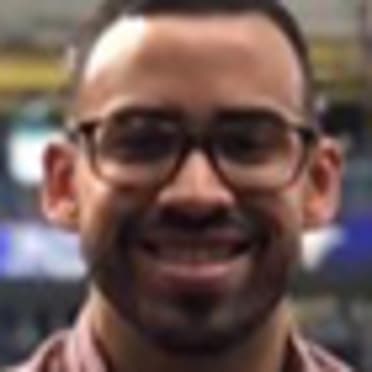Pages' Cuban roots are ingrained in his bat
This story was excerpted from Juan Toribio’s Dodgers Beat newsletter. To read the full newsletter, click here. And subscribe to get it regularly in your inbox.
ST. LOUIS -- Before his Major League debut, Dodgers outfielder Andy Pages stood in the home dugout at Dodger Stadium, gripping his bat firmly with both hands as he stared onto the playing field.
That night, Pages was using a bat that originally belonged to longtime Cuban big leaguer José Abreu. The veteran first baseman had given the bat to Miguel Vargas during a workout and Vargas, who was Pages’ closest friend on the Dodgers before he was traded to the White Sox two weeks ago, handed it off to the Dodgers’ rookie outfielder.
For Pages, using Abreu’s bat was a privilege. Abreu is one of the most successful Cuban-born hitters in Major League history. But in reality, using any bat, especially at this level, was something Pages only dreamt of.
In fact, the first bats Pages used in his life didn’t come from a fancy shop or an established manufacturer. Instead, it was his father, who built a life as a carpenter back in Cuba, who helped make Pages’ first few bats as he started to fall in love with baseball.
“His main job was fixing up boats and stuff like that,” Pages said in Spanish. “But he had friends that would specialize in wood. So they would give him some wood and they would make me some bats.”
As you can imagine, Pages’ first few bats were just good enough for him to get his start in recreational baseball, but paled in comparison to the lumber he has enjoyed as a professional, and the ones he’ll sport during his first Players' Weekend against the Cardinals.
But those experiences growing up in Cuba give Pages the needed perspective as he continues to build a successful rookie season for the Dodgers.
“I feel great that I made it [to the big leagues],” Pages said. “But what I’m really proud of is that people stop my parents in Cuba just to tell them how great I’m doing and what a good job they did raising me. People telling them that gives me more joy than anything else.”
Growing up in Cuba, Pages joked he was the most annoying kid in his neighborhood. He liked to tease and crack jokes. But what he loved most was playing sports. Pages played soccer, basketball and baseball every chance he got. Though he enjoyed playing soccer and basketball, it became clear from a young age that baseball was Pages’ true love.
Using those bats crafted by his dad, Pages’ career began to take off. Despite never playing in the Cuban National Series, Pages was one of the most recognized young players in the island. That’s why when he turned 16, he realized he wanted to take the necessary -- but scary -- leap of trying to get signed by a Major League organization.
Pages got his family together one afternoon and broke the news. He was going to head to the Dominican Republic in hopes of getting signed.
“I was just young and really wasn’t thinking about anything else,” Pages said. “All I was thinking about was, ‘Okay, I’m going to leave Cuba and I’m going to make it,’ but I could’ve never imagined every obstacle that was going to be thrown my way.”
As is the case for most Cuban-born players who look to get signed, finding an organization to take a chance on them doesn’t happen overnight. Pages said he was “one of the lucky ones” that didn’t have a traumatizing defection story, and he had the financial means to have a somewhat decent experience as he looked for the elusive contract.
Still, Pages didn’t realize chasing his dream would mean spending seven years without visiting Cuba until last winter, which in turn meant spending more than half a decade without seeing his family and friends. His family, outside of his wife, still hasn't watched him play in person. If a bad storm passes through Cuba, Pages might go days without hearing from his family as the lines of communication get destroyed in the island.
All of those things are what Pages has had to endure over the past seven years. But to Pages, saying goodbye to his father when he departed Cuba is what the young outfielder now describes as the toughest moment of his life.
“I’ve gone through a lot of things in my life,” Pages said. “But when I left Cuba, from the moment I told him I was leaving, he just started crying. It was the first time I ever saw him cry.”
That pain comes from the unknown. Pages went eight months without getting signed, repeatedly getting told by scouts that he didn’t have the speed to be a Major League outfielder. After he signed with the Dodgers, his weight came into question for a large part of his development.
One thing Pages always proved he could do, however, was hit a baseball. He raked through every Minor League level and made his big league debut earlier this season. Now Pages has plenty of gear to choose from with his name on it. Maybe he’ll pass it down to the next generation of Latin players.
But the most special bats will always be the ones at home, the ones his father crafted and what started it all.
“When I went back to Cuba, I took him a few of my bats,” Pages said. “That was really cool.”

